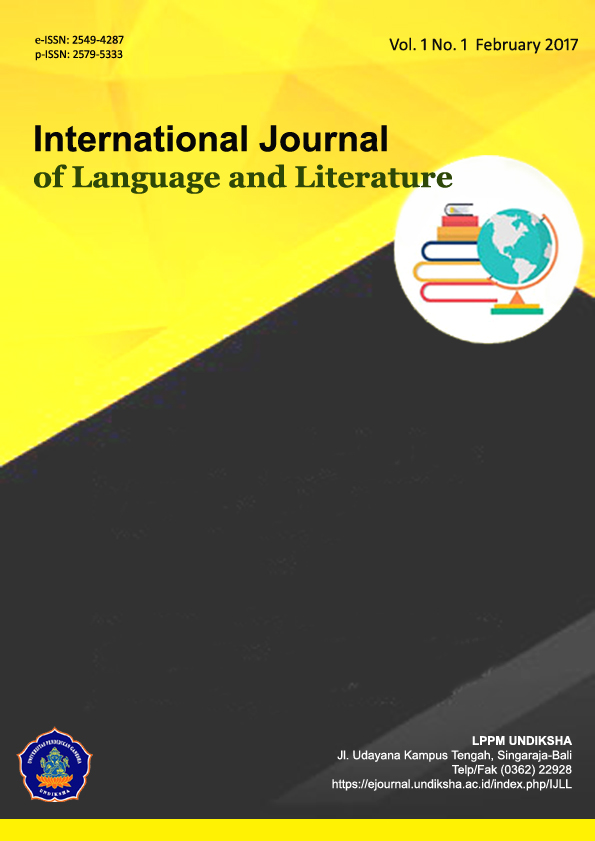THE IMPACT OF FLIPPED LEARNING 3.0 AND SELF REGULATED LEARNING TOWARD ELEVENTH GRADE STUDENTS’ SPEAKING PERFORMANCE
DOI:
https://doi.org/10.23887/ijll.v4i3.30296Keywords:
flipped learning 3.0, self-regulated learning, speaking performanceAbstract
This study aimed to investigate the impact of flipped learning 3.0 and self-regulated learning on eleventh grade students’ speaking performance in SMA N 1 Sukasada. This study was quasi-experimental research. Forty-seven of eleventh grade students were the sample of this study that were divided into two groups by using cluster random sampling, namely experimental and control groups. The data were collected through a survey and post-test. The data were analyzed using a two-way ANOVA. The result showed that flipped learning 3.0 gave a significant difference on students’ speaking performance. Meanwhile, self-regulated learning did not give any significant differences on students’ speaking performance between those who had high and low self-regulated learning Moreover, there was no interaction effect between flipped learning 3.0 and self-regulated learning. Through the implementation of flipped learning 3.0 and self-regulated learning, the students were stimulated to learn independently. Thus, it creates their understanding and be active in the learning.References
Ahmadi, M. R. (2018). Mohammad Reza Ahmadi 1*. International Journal of Research in English Education (IJREE), 3(2), 115–125. DOI: https://doi.org/10.29252/ijree.3.2.115
Alafgani, M., & Purwandari, E. (2019). Self-efficacy, academic motivation, self-regulated learning and academic achievement. Jurnal Psikologi Pendidikan Dan Konseling: Jurnal Kajian Psikologi Pendidikan Dan Bimbingan Konseling, 5(2), 104. https://doi.org/10.26858/jppk.v5i2.10930 DOI: https://doi.org/10.26858/jppk.v5i2.10930
Altun, M. (2015). The Integration of Technology into Foreign Language Teaching. International Journal on New Trends in Education and Their, 6(1), 8. www.ijonte.org
Arianti, N. M. S. (2017). Self-Regulated Learning Implemented By the Students of Elementary School in Buleleng Sub-District. International Journal of Language and Literature, 1(4), 221. https://doi.org/10.23887/ijll.v1i4.12585 DOI: https://doi.org/10.23887/ijll.v1i4.12585
Baytak, A., Tarman, B., & Ayas, C. (2011). Experiencing technology integration in education: Children’s perceptions. International Electronic Journal of Elementary Education, 3(2), 139–151.
Bergmann, J. (2017). Flipped Learning 3.0: Flipped Learning Will Never be the Same. www.yotube.com. https://www.youtube.com/watch?v=gppL3mw8SsU
Bergmann, J., &Sams, A. (2012). Flip Your Classroom. Jonathan Bergmann.
Carneiro, R., Lefrere, P., Steffens, K., Underwood, J. (Eds). (2011). Self-Regulated Learning in Technology Enhanced Learning Environments (Vol 5). Rotterdam/ Boston/ Taipei: Sense Publisher. DOI: https://doi.org/10.1007/978-94-6091-654-0
Cheng, C. (2011). The role of self-regulated learning in enhancing learning performance. January 2011.
Geduld, B. (2016). Exploring differences between self-regulated learning strategies of high and low achievers in open distance learning. Africa Education Review, 13(1), 164–181. https://doi.org/10.1080/18146627.2016.1182739 DOI: https://doi.org/10.1080/18146627.2016.1182739
Gorgoretti, B. (2019). The use of technology in music education in North Cyprus according to student music teachers. South African Journal of Education, 39(1), 1–10. https://doi.org/10.15700/saje.v39n1a1436 DOI: https://doi.org/10.15700/saje.v39n1a1436
Khajloo, A. I. (2013). Problems in Teaching and Learning English for Students. International Journal of Engineering Research, 7(3), 56. www.ijerd.com
Köroğlu, Z. Ç., & Çakır, A. (2017). Implementation of flipped instruction in language classrooms : An alternative way to develop speaking skills of pre-service English language teachers Zeynep Çetin Köroğlu Abdulvahit Çakır Gazi University , Turkey. International Journal of Education and Development, 13(2), 42–55.
Kızıl, A., & Savran, Z. (2018). Assessing self-regulated learning: The case of vocabulary learning through information and communication technologies. Computer Assisted Language Learning, 31(5–6), 599–616. https://doi.org/10.1080/09588221.2018.1428201 DOI: https://doi.org/10.1080/09588221.2018.1428201
Kosnin, A. M. (2007). Self-regulated learning and academic achievement in Malaysian undergraduates. International Education Journal, 8(1), 221–228.
Liando, N. V. F., & Lumettu, R. (2017). Students’ Personal Initiative towards their Speaking Performance. International Education Studies, 10(8), 21. https://doi.org/10.5539/ies.v10n8p21 DOI: https://doi.org/10.5539/ies.v10n8p21
Pallant, J. (2011). For the SPSS Survival Manual website , go to www.allenandunwin.com/spss This is what readers from around the world say about the SPSS Survival Manual :
Quyen, T. T. T., & Loi, N. V. (2018). Flipped model for improving students’ English speaking performance. Can Tho University Journal of Science, 54(2)(January), 90. https://doi.org/10.22144/ctu.jen.2018.012 DOI: https://doi.org/10.22144/ctu.jen.2018.012
Sarasfiya, M. (2018). APPLYING FLIPPED CLASSROOM MODEL TO ENHANCE STUDENTS ’ SPEAKING SKILL Mella Sarasyifa FACULTY OF EDUCATIONAL SCIENCES.
Swary, D. N. (2014). a Study of Students ’ Problems in Learning Speaking English At the Second Grade of Faculty of Tarbiyah and Teaching Science of Syekh Nurjati State Institute for Islamic Studies. 1.
Zeleke, W. A., Karayiğit, C., & Myers-Brooks, K. (2018). Using Self-Regulated Learning Strategies to Develop Students’ Multicultural Counseling Competency. Journal of Multicultural Counseling and Development, 46(1), 40–57. https://doi.org/10.1002/jmcd.12091 DOI: https://doi.org/10.1002/jmcd.12091
Downloads
Published
How to Cite
Issue
Section
License
IJLL Journal provides immediate open access to its content on the principle that making research freely available to the public to supports a greater global exchange of knowledge.

This work is licensed under a Creative Commons Attribution-ShareAlike 4.0 International License







